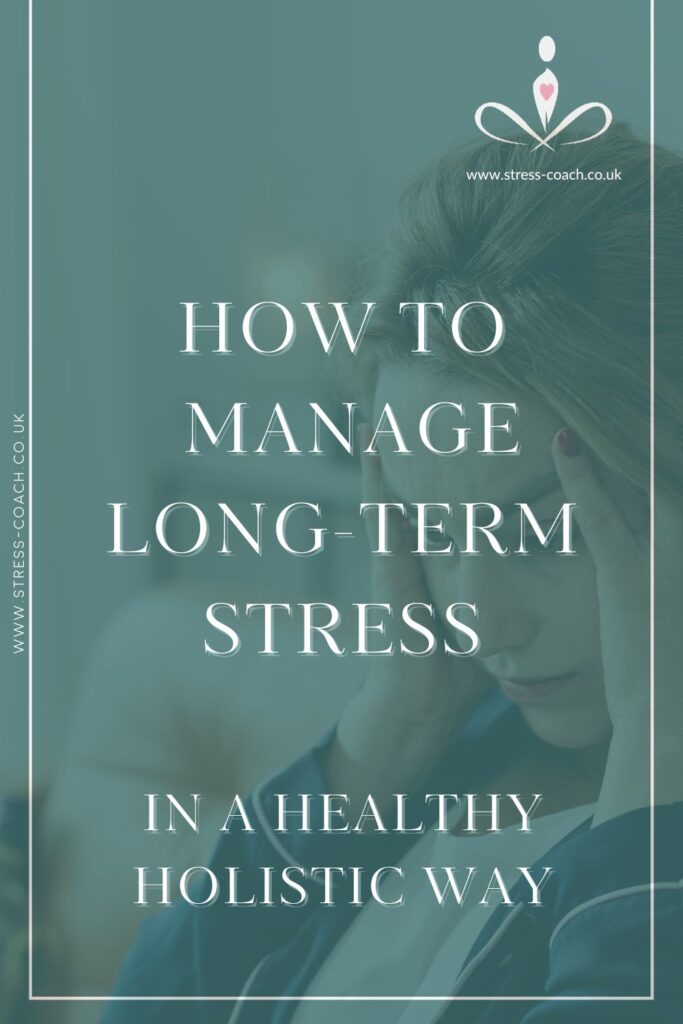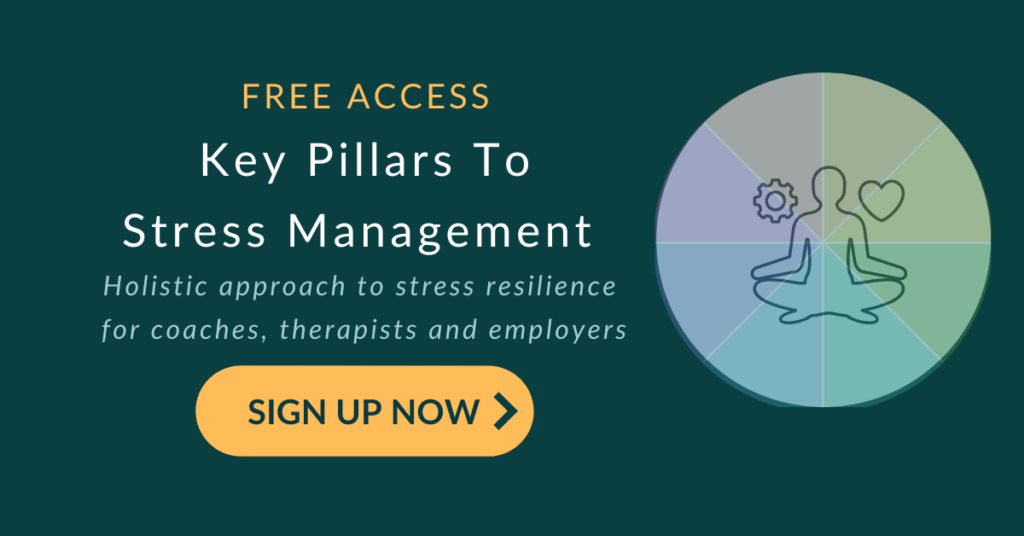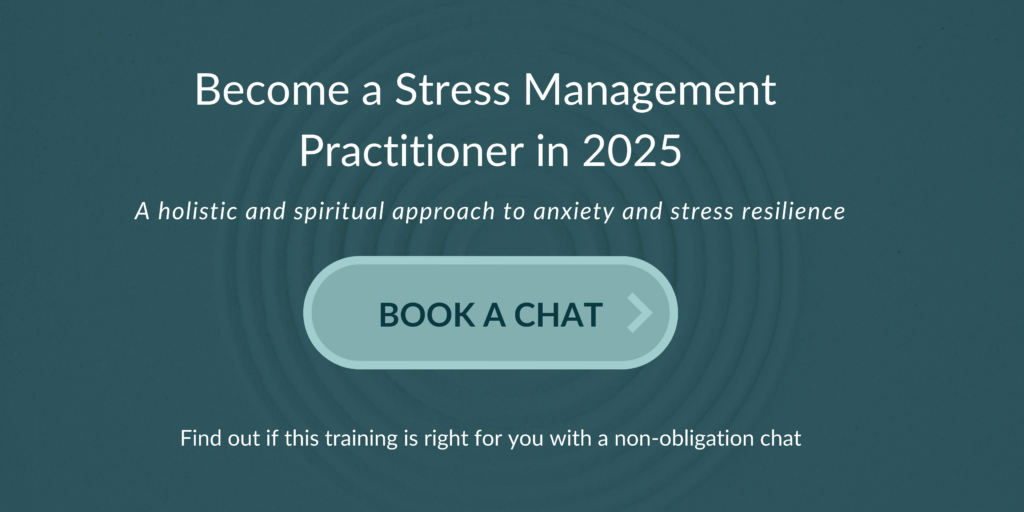Long-term Stress can lead to an array of physical, mental, and emotional symptoms and conditions. The longer chronic stress goes on the more likely you are to suffer from a wide range of chronic stress issues.
Common long-term and chronic stress-related symptoms include insomnia, high blood pressure, breathing issues, inflammation, gut issues, feelings of being unable to cope, emotional distress, and/or finding it difficult to sit down, relax and/or switch off.
Sadly so many people don’t seek help advice or support to help manage their stress until their stress and anxiety are at such a seriously debilitating level, they are in a state of great dis-ease or point of despair. Too many by then have serious health concerns and/or have had to take time out from work and other commitments.
Many have been trying to muddle through their long-term stress and/or exhaustion with chronic sleep problems, high levels of anxiety, and a general feeling of being constantly wired.

Why Stress Education Is So Important In Managing Long-Term Stress
When managing long-term stress it is important to educate the client or patient to understand what long-term stress is.
Helping them understand why they are experiencing their presenting symptoms can help change unhealthy behaviours that are contributing to their stress.
.Once the person can understand the physiological elements of the stress response, they understand why they are feeling the way they do and why certain approaches to life and their stress can be seriously beneficial.
It is also important for people to understand “eustress” the types of stress that can be good for you, and why it can be motivating.
Stress Awareness In The Workplace
Stress Awareness Training provides everyone involved with a deeper understanding and awareness of the variety of causes that can lead to stress and anxiety, empowering individuals, colleagues, and management to take action, and make healthier and positive changes in their environment to support a healthier and balanced lifestyle and attitude.
Stress Awareness at work can help not just encourage healthier work environments but eliminate common misconceptions and discrimination around chronic stress sufferers. They can be really helpful at supporting better team-building strategies and identifying specific stress risks in the workplace.
Stress Management Counselling
Stress Management Counselling or Stress Coaching Sessions are tailored to an individual’s needs. Uniquely designed to support and guide clients towards a healthier perspective that empowers them to manage their lives and their stress from a healthier approach. It involves teaching clients the tools and techniques so they learn to manage their stress more effectively.
Each client or employee comes with a different set of life challenges, mental perspectives, a different set of responsibilities, and of course different built-in coping mechanisms. So it’s important to tailor a plan that suits them and their presenting life challenges.
Stress Management Analysis
Although identifying the cause of stress and taking action when possible is important. Many clients arrive so overwhelmed, anxious and stressed with what they perceive as their main source of stress. But on close or further inspection, they eventually realise it is indeed another work or life challenge or area that is their main issue.
So having the right sort of analysis and assessment tools to identify areas quickly and effectively can be extremely beneficial for both practitioner and client, this should also include simple strategies and tools that can be passed easily on to the client, helping empower the client to manage their stress effectively over their lifetime. That is why in our Accredited Stress Management Practitioner Training students are given access to a variety of stress management analysis tools.
The Power Of Relaxation Therapy In Long-Term Stress
The biggest problem with long-term stress is that it causes the person to feel constantly “stressed out” and unable to relax and switch off. Learning highly effective relaxation techniques is very effective and important in helping the client come off the “stress response” into the “relaxed response”.
That is why the safe and effective use of relaxation therapy by a qualified relaxation therapist is one of the most highly effective ways to help someone fully recover from long-term chronic stress. The main difference with our Accredited Relaxation Therapist Training is the level of in-depth training and access to over 25 anxiety and stress-busting tools and techniques.
Holistic Approach To Reducing Long-Term Stress
One of the most important aspects of stress management and stress reduction is remembering that every person, every client and patient is different. No one size fits all, a more holistic approach to Stress Management helps tailor any support, training or sessions to the client’s needs. Something we believe is of vital importance at our stress management training school
Taking a holistic approach to stress management helps you look at every area of your life that is out of balance, that is putting pressure on different areas of your life. It helps treat the person, the individual than approach it from a one size fits all approach which is rarely helpful.
That is why a more tailored holistic approach that empowers the client or student is extremely valuable at not just reducing long-term stress but helps give the client the stress management skills to help themself. That is why the right holistic stress management approach helps not just eliminate chronic and long-term stress but tends to reduce the risk of further chronic stress, assisting us to live much happier and healthier lives.
Originally published 2013 updates 2023







Thanks for sharing this Eileen! Very helpful information about not letting stress go and affect one’s well-being. If one can’t remove the stress that is there long term learning positive skills to deal with it is a must.
You welcome Cindy and in ways very true, but most modern days stress is in many ways just a perception